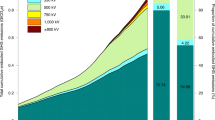Abstract
The inter-regional ultra-high voltage (UHV) projects are crucial for power systems. Carbon emissions associated with the power sector cannot be ignored. In this paper, based on the panel data of 198 prefecture-level cities in China from 2009 to 2019, a multi-period difference-in-difference model is developed for the first time to examine the impact of UHV projects on carbon emissions. Empirical results show that UHV projects increase overall carbon emissions. This impact can also be achieved through the mechanisms of the scale of power generation and the level of economic development. Heterogeneity research demonstrates that the carbon emissions issue of UHV projects is more significant in cities with low levels of economic development and a large proportion of secondary industries. Extensibility research shows that UHV projects have a more significant impact on carbon emissions in power-sending cities than that in power-receiving cities. The more clean power the UHV transmission lines transmit, the less impact on carbon emissions. This study not only enhances our understanding about the impact of UHV projects on carbon emissions, but also provides inspiration for the low-carbon pathway transition.


Similar content being viewed by others
Data Availability
All data sources for this study are described in the article.
References
Hübner M (2012) Do tuition fees affect enrollment behavior? Evidence from a ‘natural experiment’ in Germany. Econ Educ Rev 31(6):949–960. https://doi.org/10.1016/j.econedurev.2012.06.006
Jiang Q, Khattak SI, Rahman ZU (2021) Measuring the simultaneous effects of electricity consumption and production on carbon dioxide emissions (CO2e) in China: new evidence from an EKC-based assessment. Energy 229(120):616. https://doi.org/10.1016/j.energy.2021.120616
Li W (2019) DID design in the policy evaluation: origins, evolution, and latest frontiers. Journal of Gansu Administration Institute 02:36–44+127. (In Chinese)
Li Y, Lukszo Z, Weijnen M (2016) The impact of inter-regional transmission grid expansion on China’s power sector decarbonization. Appl Energy 183:853–873. https://doi.org/10.1016/j.apenergy.2016.09.006
Li Y, Yi BW, Wang Y (2020) Can ultra-high voltage power transmission bring environmental and health benefits? An assessment in China. J Clean Prod 276(124):296. https://doi.org/10.1016/J.JCLEPRO.2020.124296
Lin B (2022) China’s high-quality economic growth in the process of carbon neutrality. Econ Res 57:56–71. (In Chinese)
Liu F (2022) The impact of China’s low-carbon city pilot policy on carbon emissions: based on the multi-period DID model. Environ Sci Pollut Res. https://doi.org/10.1007/s11356-022-20188-z
Liu M, Niu X, Tian Z (2022) Revealing the transmission mechanism and spatial spillover of carbon emission reduction caused by high-speed rail opening. PLoS ONE 17:1–17. https://doi.org/10.1371/journal.pone.0271585
Liu Z (2015) Ultra-high voltage AC / DC grids. Academic Press, Boston,. https://doi.org/10.1016/B978-0-12-802161-3.00001-9
NEA (2021) National energy administration, China. http://www.nea.gov.cn
Qi S, Cheng S, Cui J (2021) Environmental and economic effects of China’s carbon market pilots: empirical evidence based on a DID model. J Clean Prod 279(123):720. https://doi.org/10.1016/j.jclepro.2020.123720
Ren H, Gu G, Zhou H (2022) Assessing the low-carbon city pilot policy on carbon emission from consumption and production in China: how underlying mechanism and spatial spillover effect? Environmental Science and Pollution Research (0123456789). https://doi.org/10.1007/s11356-022-21005-3
Tan X, Lin S, Liu YL et al (2020) Has the inter-regional transmission grid promoted clean power development? A quantitative assessment on China’s electricity sector. J Clean Prod 269(122):370. https://doi.org/10.1016/J.JCLEPRO.2020.122370
Tan X, Lin S, Liu YL et al (2022) Has the inter-regional transmission expansion promoted the low-carbon transition of China’s power sector? Comput Ind Eng 168(108):059. https://doi.org/10.1016/J.CIE.2022.108059
Wei W, Wu X, Wu X et al (2017) Regional study on investment for transmission infrastructure in China based on the State Grid data. Frontiers of Earth Science 11(1):162–183. https://doi.org/10.1007/s11707-016-0581-4
Wei W, Wu X, Li J et al (2018) Ultra-high voltage network induced energy cost and carbon emissions. J Clean Prod 178:276–292. https://doi.org/10.1016/J.JCLEPRO.2017.12.175
Wei W, Hao S, Yao M et al (2020) Unbalanced economic benefits and the electricity-related carbon emissions embodied in china’s interprovincial trade. J Environ Manag 263(110):390. https://doi.org/10.1016/j.jenvman.2020.110390
Wen S, Liu H (2022) Research on energy conservation and carbon emission reduction effects and mechanism: quasi-experimental evidence from China. Energy Policy 169(113):180. https://doi.org/10.1016/J.ENPOL.2022.113180
Xiao K, Yu B, Cheng L et al (2022) The effects of CCUS combined with renewable energy penetration under the carbon peak by an SD-CGE model: evidence from China. Appl Energy 321(119):396. https://doi.org/10.1016/j.apenergy.2022.119396
Yang J, Xiong G, Shi D (2022) Innovation and sustainable: can innovative city improve energy efficiency? Sustainable Cities and Society 80(103):761. https://doi.org/10.1016/j.scs.2022.103761
Younis RM, Wolstenholme JT, Bagdas D et al (2019) Adolescent but not adult ethanol binge drinking modulates ethanol behavioral effects in mice later in life. Pharmacology Biochemistry and Behavior 184(172):740. https://doi.org/10.1016/j.pbb.2019.172740
Yuan J, Shen J, Pan L et al (2014) Smart grids in China. Renew Sust Energ Rev 37:896–906. https://doi.org/10.1016/J.RSER.2014.05.051
Zhang Y, Ma T, Guo F (2018) A multi-regional energy transport and structure model for China’s electricity system. Energy 161:907–919. https://doi.org/10.1016/J.ENERGY.2018.07.133
Zhang Y, Liu T, Yao L et al (2023) Negligible carbon costs of UHVDC infrastructure delivering renewable electricity. Resour Conserv Recycl 192(106):940. https://doi.org/10.1016/j.resconrec.2023.106940
Zhang Z, Zhang J, Feng Y (2021) Assessment of the carbon emission reduction effect of the air pollution prevention and control action plan in China. International Journal of Environmental Research and Public Health 18(24):13,307. https://doi.org/10.3390/IJERPH182413307
Zhou A, Xin L, Li J (2022) Assessing the impact of the carbon market on the improvement of China’s energy and carbon emission performance. Energy 258(124):789. https://doi.org/10.1016/J.ENERGY.2022.124789
Zhou L, Chen Y (2005) The policy effect of tax-and-fees reforms in rural China: a difference-in-differences estimation. Economic Research Journal 08:44–53. (In Chinese)
Funding
This work was partially supported by the Humanities and Social Sciences of Ministry of Education Planning Fund of China (21YJA790009), the Key Program of Decision Consultation of Beijing Social Science Foundation (21JCB106), the National Natural Science Foundation of China (72140001).
Author information
Authors and Affiliations
Contributions
Conceptualization, Yuanying Chi and Wenbing Zhou; investigation, Yuanying Chi; methodology, Zhaoxuan Qiao; guidance, Wenbing Zhou; writing—reviewing and editing, Mengwan zhang and Xufeng Zhang. All authors read and approved the final manuscript.
Corresponding author
Ethics declarations
Ethics approval and consent to participate
Not applicable.
Consent for publication
Not applicable.
Competing interests
The authors declare no competing interests.
Additional information
Responsible editor: V.V.S.S. Sarma.
Publisher's Note
Springer Nature remains neutral with regard to jurisdictional claims in published maps and institutional affiliations.
Rights and permissions
Springer Nature or its licensor (e.g. a society or other partner) holds exclusive rights to this article under a publishing agreement with the author(s) or other rightsholder(s); author self-archiving of the accepted manuscript version of this article is solely governed by the terms of such publishing agreement and applicable law.
About this article
Cite this article
Chi, Y., Qiao, Z., Zhou, W. et al. The impact of ultra-high voltage projects on carbon emissions in China. Environ Sci Pollut Res 30, 92135–92145 (2023). https://doi.org/10.1007/s11356-023-28565-y
Received:
Accepted:
Published:
Issue Date:
DOI: https://doi.org/10.1007/s11356-023-28565-y




